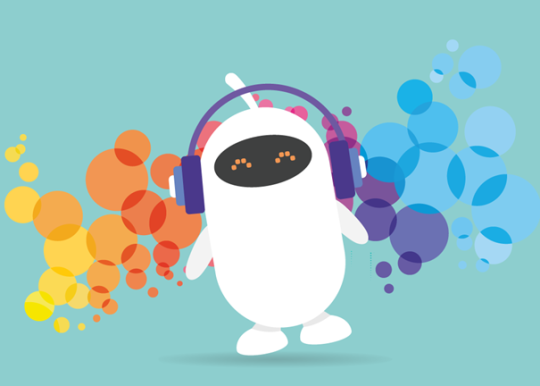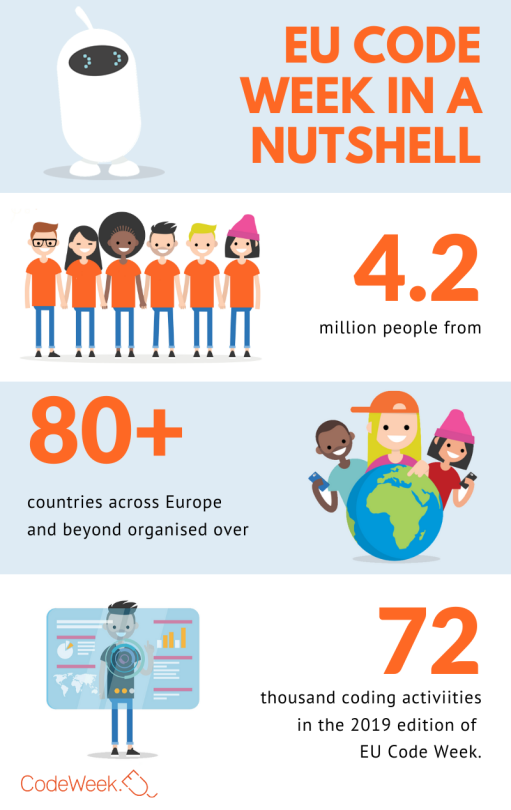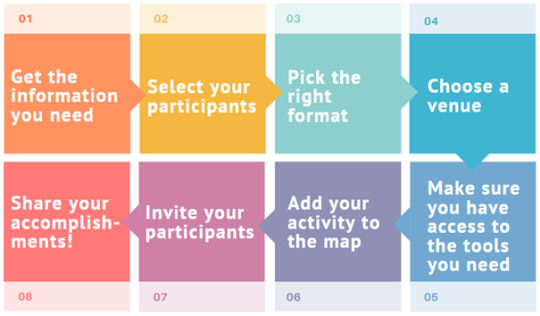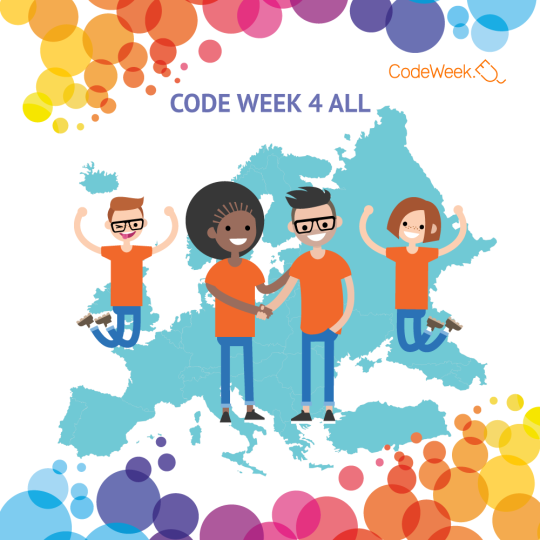The Ultimate Guide to organising a Code Week activity
Publication date: July 17, 2020
Code is everywhere around us. Playing a computer game, sending an email, watching an episode of The IT Crowd on Netflix, even taking a selfie – all these actions wouldn’t be possible without code. Seemingly effortless, these activities involve lots of complex algorithms and computer scientists, developers, software engineers spend numerous hours working on them.
And it gets even more exciting when you get to know what’s behind your favourite applications, and you realise your own ideas through code. That’s why EU Code Week focuses on making programming more visible – to show young, adults and elderly how you bring ideas to life with code, to demystify these skills and bring motivated people
together to learn.
What is EU Code Week (and why does it matter)?
< 1 > Why coding matters
For starters, coding is fun, and it’s creative! Imagine yourself as an artist, creating the work of a lifetime – you have something to say and you want to show it to the world.
Well, your computer, tablet, phone or any device you’re using is your brush and the coding language you are writing in is your paint. Unlock your artistic mind and start coding.
Programming also teaches you how to solve problems. To code means to break down complex problems into smaller ones and to tell a computer how to solve them. Much like composing music – to create a melody you need to write note after note, and these notes might not mean much individually, but when you play them together, your song comes to life.

On a more serious note, coding helps you realise your academic or professional goals. Let’s say you are a marine scientist or oceanographer and your mission is to protect
marine life. Coding helps you write programs which can track endangered species and know about threats against them in advance. Pretty cool, don’t you think? Truth
is, there are hardly any jobs nowadays where no digital skills are required. Giving pupils the chance to learn code gives them a significant advantage both academically and professionally making them more competitive and qualified candidates.
< 2 > What is EU Code Week?

< 3 > Why you should get involved
We’ve said it before, and we’ll say it again – Code Week is for Everyone. Are you a schoolteacher who wants to bring innovation to your classroom and who wants to prepare their pupils for the digital world? Are you a librarian looking to create a new digital cataloguing system? Are you a teenager interested in coding, but you don’t know where to start? Or a parent looking for ideas on what activities to try out with your children during summer vacation? Or even a grandparent looking to take bedtime stories to the
next level? (In that case Scratch is the app you need!) Or simply an enthusiast who loves the world of coding and wants to be a part of a great initiative? Then EU Code Week is for you.
< 4 > When does it take place?
Officially, EU Code Week takes place in October. In 2022, we celebrate it between 8 and 23 October. Be that as it may, every week is Code Week, and you can register a coding activity any time of the year.
< 5 > Terms to know
Coding
It’s no surprise that we start with this one. Coding refers to writing a precise set of instructions that a computer can understand to execute an action – creating computer programming code. Coding is, therefore, the primary method for allowing intercommunication between humans and machines.
Computational thinking
As you might have learned from our Code Week ‘Icebreaker’ massive open online course, computational thinking describes a way of looking at problems and systems so that a computer can be used to solve or understand them. Computational thinking is not only essential to the development of computer programs and understanding programming languages but can also be used to support problem-solving across all disciplines and sectors.
EU Code Week Ambassadors
The Code Week ambassadors are the people responsible for EU Code Week on a national level. They are the people you first turn to if you have any questions. You can find your country representatives here.
Leading teachers
The EU Code Week leading teachers are active teachers of the community who have a lot of experience in organising coding activities. These Code Week veterans are the
ones teachers turn to for best practices and tips on how to teach coding.
Edu coordinators
The Education Ministry coordinators have the task to coordinate Code Week activities within the national education system and help reach out to schools and teachers.
How to participate in EU Code Week?
Now that we know enough about EU Code Week, it’s time to learn how to organise and register a coding activity. We’ve divided the process into eight simple steps you can follow for a foolproof outcome.

< 1 > Get the information you need.
If you’re new to coding and EU Code Week, the first thing to do is to learn. Learning is a lifelong experience, and so is coding. There are plenty of resources available
on the Code Week website, including lesson plans and video tutorials, all of them available in 29 languages. Here are some that might be useful for you:
- This toolkit for activity organisers;
- These video tutorials with unplugged activities – a great way to start teaching younger pupils
the basics of computational thinking, at home or in school; - This endless list of resources to learn coding (and they’re for free);
- Or to teach it;
- These ready-made lesson plans we like to call ‘learning bits’, take a pick or even better, let your students
pick one they find interesting! - If you
need even more, sign up for our Deep Dive online course, registration is now open.
< 2 > Select your participants.
It’s important to remember that anyone can participate in a coding activity. All you need is a group of people who want to learn something new, like your pupils or your
colleagues, maybe friends or parents too. Your choice! If you’re organising a more complex activity, it’s a good idea to involve other trainers who will help you
coordinate it.
< 3 > Pick the right format.
This one is entirely up to you. A coding activity can be rather simple, like a classroom lesson involving an innovative tool or approach, for example, a game with Scratch to
learn about the universe. It can also be light years ahead, like developing a mobile app with high-school classmates.
< 4 > Choose a venue.
Now that you know what type of activity you want to organise, you need a place to learn. You can choose a classroom, library, or even a public park, as long as you have an
internet connection, you’re good to go. You can also organise an entirely virtual activity and use tools like Zoom or Teams to communicate with your group.
< 5 > Make sure you have access to the tools you need.
Speaking of Wi-Fi, you also need to make sure you have all the learning materials and resources you might need. Our recommendation is to use open-source material, and if you’re organising a large-scale activity, preparing a proper time plan and keeping track of your To-Do’s is always a good idea.
<6 > Add your activity to the map.
Register your activity on the codeweek.eu website Make sure to add as much information as possible so that other people can see what you’re doing. This way, you can connect with other coding enthusiasts and get tips from others who have organised a similar activity before. All activities are displayed on our interactive map.
< 7 > Invite your participants.
Invite your participants and support and motivate them to learn throughout your activity. Once your activity has finished report it on the website. You are now ready to download a certificate of participation. You can also download certificates and personalise them for all participants – either through your profile or the teacher’s
info package.
< 8 > Share your accomplishments!
And finally, share your success with your community and motivate others to gain new skills and take part in Code Week. If you’re a teacher, join our Facebook Group for Teachers, or follow our Twitter, Instagram and Facebook accounts for daily updates.
Feeling like a Code Week expert already? If you need an even more exciting opportunity to develop your coding skills, take part in the Code Week 4 All challenge. This challenge lets you connect with other participants and link your activities with others organised by friends or colleagues. And guess what – once you complete the challenge, you will earn the Code Week Certificate of Excellence! All you need to do is register at least 10 activities from 10 different organisers or connect with organisers from two other countries and join your activities. Here you can find a step-by-step guide on how to participate, and on this Padlet you can find a partner and get in touch with them for a collaboration.

How to Other useful resources
Don’t forget to register for our next massive open online course – the Deep Dive MOOC. It starts on 15 September and will remain open until the end of October. In the course you’ll get an even more profound understanding of coding and computational thinking and learn all about the Code Week movement. No previous coding experience is needed.
Ready, steady, code!


